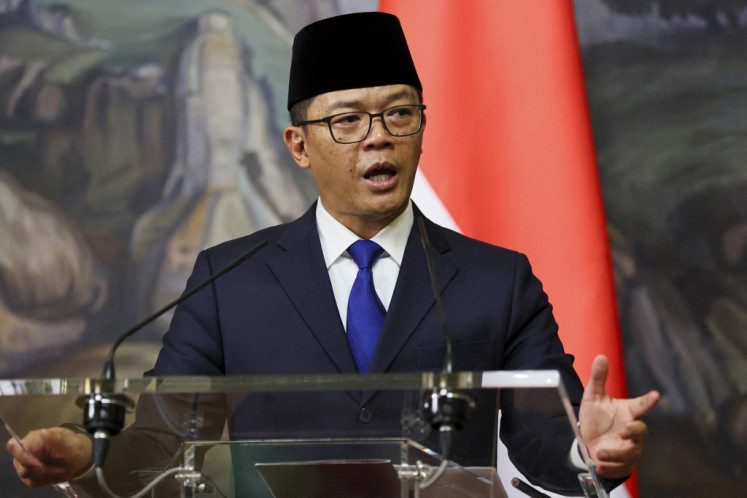Popular Reads
Top Results
Can't find what you're looking for?
View all search resultsPopular Reads
Top Results
Can't find what you're looking for?
View all search resultsG20 pandemic fund set to launch this month: Sri Mulyani
Change text size
Gift Premium Articles
to Anyone


The Group of 20 nations are finalizing a financial intermediary funding (FIF) initiative intended to ensure that the world is better prepared for future pandemics, and they expect it to come into effect in June, Finance Minister Sri Mulyani has said.
The group has provisionally agreed to establish a multibillion dollar fund that health officials say will help finance pandemic surveillance, research and improved access to vaccination for lower-to-middle-income countries, among other measures.
According to Sri Mulyani, a G20 finance and health ministers' meeting on Tuesday discussed ways to close the pandemic resource gap between high- and low-income countries.
She added that the group was seeking to accommodate a variety of voices with regard to the fund’s use, so that it was “not dominated by the founder or the contributor but also included the recipient".
Sri Mulyani noted that the board of the World Bank would have to approve the FIF initiative’s design before it was established. The World Bank will manage the fund.
The G20 aims to raise US$1.5 billion this year for the FIF program. Health Minister Budi Gunadi Sadikin said in an interview with Reuters last week that the United States, the European Union, Indonesia, Singapore and Germany had collectively pledged some $1.1 billion so far.
The WHO and the World Bank estimate that the annual gap in pandemic preparedness funding is $10.5 billion and say any fund seeking to address it would need to be financed over five years, suggesting a total of more than $50 billion.
US Treasury Secretary Janet Yellen said in April that existing systems had been unable to provide the resources needed to address current health issues, while a lack of funding and preparedness was making the world more vulnerable to future pandemic threats.
An FIF instrument would provide a dedicated and accountable mechanism to drive resources toward the issue, Yellen said, adding that the fund could incentivize low- and middle-income countries to leverage existing domestic or regional resources for healthcare spending.
Financial capabilities
Sri Mulyani also reported that the G20 ministers had discussed potential arrangements for financial and health coordination for future pandemic protection. A task force to address the issue was established under Italy’s G20 presidency last year.
The same year, G20 leaders signed the Rome Declaration, which sought to improve and better coordinate financing for pandemic preparedness, prevention and response.
The COVID-19 pandemic has had a disproportionate impact on many of the world’s most vulnerable countries, showing the weaknesses of global health systems.
Minister Budi also said on Tuesday that national finances played a significant role in a country’s pandemic response. He stressed the importance of intermediary funds to bolster the global health system.
“Money is half of the solution to health crises. We need to translate this money into access to vaccines, medicine and diagnostic tools,” he said.
Budi said that after the G20 health fund was launched, the group would discuss three other main issues: efforts to link international labs for genome sequencing, the standardization of global health protocols and the expansion of global health research and manufacturing hubs.
The G20’s second finance and health ministers' meeting is scheduled for November.









